TODAY CQN brings you the eighteenth EXCLUSIVE extract from Alex Gordon’s book, ‘CELTIC: The Awakening’, which was published by Mainstream in 2013.
The book covers the most amazing decade in the club’s history, the Sixties, an extraordinary period when the team were transformed from east end misfits to European masters.
ON the Monday after the 4-0 Scottish Cup Final triumph over Rangers in 1969, Celtic paraded all their trophies, the league championship, the Scottish Cup and the League Cup, before their last game against Morton at Parkhead. Possibly, the players had over-indulged in their apres-match celebrations following the romp against their Old Firm rivals.
They were dumped 4-2 with the Greenock side’s Per Bartram hitting a hat-trick in seven minutes. No-one could remember such a feat by an opposing player at Parkhead, even in the dark old days. Willie Wallace and Harry Hood scored for Celtic in a game that really didn’t matter.
Stein, though, rounded on his players afterwards. ‘He was furious,’ recalled Tommy Gemmell. ‘Big Jock was livid. “You’ve let yourselves down,” he said. “You’ve let your fans down.” There was no use in protesting. That was Celtic’s fifty-fifth game of a long campaign. A lot of the players were leg weary. Morton played as though it was their cup final. No excuses, though, we should have done better.’
Celtic did end the season on a winning note as they emerged victorious over Dundee at Dens Park. They won 2-1 with goals from Hood and the emerging Lou Macari and completed the 1968/69 league season with fifty-four points, five more than runners-up Rangers. All things considered, it had been an excellent season. Tommy Callaghan and Harry Hood were shaping as sound investments and the Celtic fans had had their first glimpse of the future in the shape of George Connelly, Lou Macari, Davie Hay, Kenny Dalglish and Jimmy Quinn.
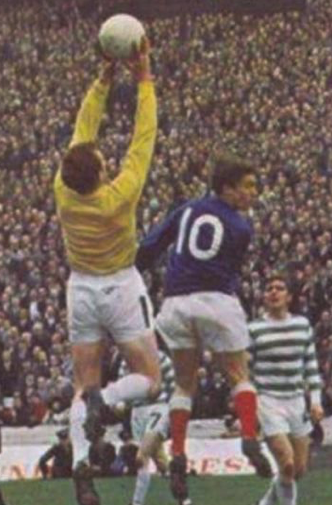
RISE AND SHINE…John Fallon takes a high ball as Willie Johnston challenges in Celtic’s 4-0 Scottish Cup Final romp.
There was the usual whirlwind start to the 1969/70 season with seven games taking place in August. ‘I often wondered if the guys who set out the fixtures at the Scottish League possessed a dodgy sense of humour,’ remarked Gemmell. ‘It seemed one minute you were on a beach enjoying welcome sunshine and your Pina Coladas and the next you were back in your football kit and preparing for another ten months of non-stop action.
‘Summers, back then, seemed to pass so quickly. No-one looked forward to pre-season training, I can tell you. Guys such as Bobby Lennox and Stevie Chalmers were lucky. They just seemed to be naturally fit guys. They could go away for two months, enjoy themselves and come back without an ounce of fat on them. Bertie Auld used to say Bobby would chase paper on a windy day! I wasn’t one to pile on the pounds, either, but, of course, I always welcomed that summer break and would return for the pre-season with a little bit added on.
‘Actually, I always started a week ahead of everyone else. I would go on long runs on my own until my legs ached. Then, the following day, I would put myself through it again. Big Jock would gather us around him on the first day of training and say, “Right, you’ve all had a good time. Remember, you’re lucky to be footballers and you’ve got to be fit to do your job. We’ll start with the easy stuff.” And then he would get Neilly Mochan and the backroom guys to run the legs off you.’
Celtic, drawn against Rangers for the third successive season in the League Cup, opened with a tie against Airdrie in Glasgow on Saturday 9 August. A packed house welcomed the treble-winners onto the impeccably manicured lawn that was the playing surface at Celtic Park. Stein hadn’t bothered dabbling in the summer transfer market. There had been much speculation about Simpson’s future and Celtic had been linked with Lennox’s old friend Ilija Pantelic, the Yugoslav international goalkeeper of Vojvodina Novi Sad, the team that had made life so difficult in the run to Lisbon.
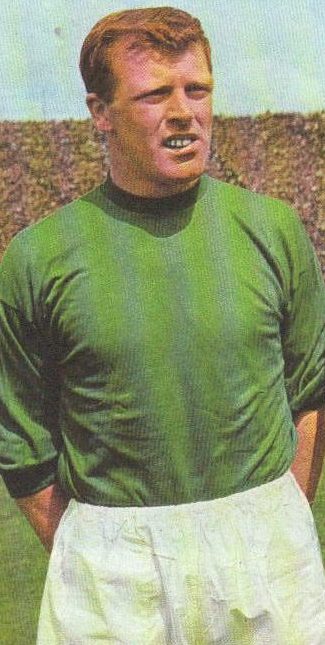
JOHN FALLON…given the backing of Jock Stein.
Stein had friends dotted around the press and wasn’t slow to drop a story on them every now and again if he didn’t think Celtic were getting the column inches they deserved in the national newspapers. It’s doubtful if Stein was ever interested in Pantelic, but, once the ‘revelation’ had hit the newsstands, it gave him the opportunity to come out and say, ‘I’ve got John Fallon here and I know he is the man to do the job for this club. I’ve got every faith in him.’ Fallon’s confidence would now be sky-high as the new campaign prepared to kick off. ‘Big Jock rates me higher than one of the world’s best goalkeepers,’ Fallon may have thought. ‘I must be good.’ If Stein hadn’t made it as a football manager, he would have been massive in PR.
‘Aye, he was brilliant at that side of things,’ said Chalmers. ‘He used to con me something rotten. He would leave me out of the side and then come up to me and say, “Why are you not in the team? You’re better than that mug. You’re a better player than him. Come on, Stevie, give yourself a shake and get into that team. That’s where you deserve to be.”‘
John Hughes backed up his team-mate. ‘He would put his arm around your shoulders and have a word. “You’ve got all the ability in the world,” he would say. “The fans want to see you in the team. You’re one of their favourites.” All that sort of thing. You knew he was at it, spinning a line, but you still listened and then went out and played out of your skin for the man, the team and the support.’
Hughes got the opening goal of the new campaign in the one-sided 6-1 victory over Airdrie. He added another as Wallace, Connelly, Hood and Gemmell joined in. It was a welcome way to usher in a new season. Without being fully stretched and not required to turn on the after-burners, they had hit six and could have had more if they had so desired. Next up was Rangers at Ibrox in midweek. Davie White, still seeking a glimpse of silverware after close on two seasons in charge, had signed one player in the summer, but it was one that made front page news and not even the wily Stein could have kept that one from being the splash story in every newspaper.
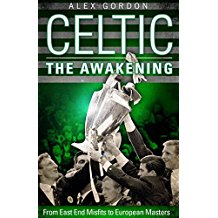
White had brought back Jim Baxter on a free transfer from Nottingham Forest. He had left the club for Sunderland for £72,500 in May 1965, moved onto Forest for £100,000 in December 1967 before being allowed to go for nothing in the summer of 1969. He was a throwback to the good, old days for Rangers while Celtic toiled miserably in the first half of the decade. Baxter, at his best, was an extravagantly-gifted midfielder with a left foot that could carve open the meanest of defences. While Celtic stumbled and fumbled around in the early part of the sixties, the Fifer won an astonishing ten of the fifteen domestic honours that were up for grabs between 1960 and 1965. He had performed in eighteen Old Firm games and had been on the losing side only twice. He was perceived as the Prodigal Son and the Messiah rolled into one when he returned to Ibrox. Everyone was aware, though, that this skilful individual possessed a self-destruct button. It was a gamble that would backfire on White and go a long way to him losing his job.
However, on a calm evening on the south side of Glasgow, Baxter did roll back the years. He inspired Rangers to a 2-1 triumph over a Celtic side that simply under-performed. Baxter, no longer known as Slim Jim, was allowed far too much time and space to captivate his audience once more after an absence of four years. Baxter was even pictured sitting on the ball during a lull in play. The home fans lapped it up. Celtic knew there were another four games to play and nothing had been decided. The League Cup had resided at Parkhead for four successive seasons and no-one was going to remove it without a fight.
The second Old Firm game of the campaign arrived the following Wednesday. Baxter was injured and sat in the Parkhead stand. Stein restored Jimmy Johnstone, missing for the first three games, to the right wing. Defeat would see the end of Celtic’s stranglehold on the trophy. Once more the club stepped onto football’s tightrope without a safety net in sight. Rangers had introduced German keeper Gerry Neef to their line-up, their third different custodian in as many years. He wasn’t obliged to do too much in the Ibrox encounter, but this was to prove to be a difficult evening for the blond No.1. Celtic rained shots down on him with Fallon a virtual spectator at the other end.
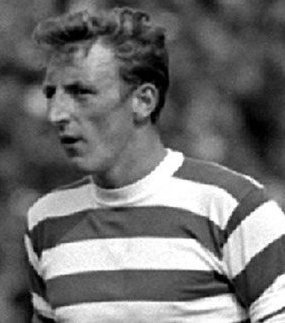
TOMMY GEMMELL…goal hero against Rangers.
Something had to give and it did when Neef, clearly alarmed at the activity in his penalty box, allowed Gemmell a chance near the end. ‘I wasn’t going to miss that one,’ recalled the full-back. ‘The keeper made a bit of a mistake, gave me a sight of goal and I tucked it away. I believe justice was done because we had dominated that match. To be honest, we were still kicking ourselves for letting them beat us at Ibrox the previous week.’
Rangers were rattled. On the day Celtic were coasting to a 3-0 triumph over Airdrie at Broomfield, the Ibrox side were being booed off the field after relying on an own goal from Eddie Polland for a 3-3 draw with Raith Rovers at Ibrox. The Baxter Feelgood Factor had very quickly evaporated. Celtic, a point ahead, were required to beat Raith Rovers in Kirkcaldy to once more advance to the quarter-final stage, dumping Rangers in the process. Stein’s men managed the feat, winning 5-2.
A crowd of 71,645 had flocked to Ibrox for Baxter’s homecoming against Celtic; only 18,000 watched him in action in the 3-0 win over Airdrie in their final League Cup-tie. With Celtic safely in the last eight of the tournament, they switched their attention to the opening encounter in the league, a game against St.Johnstone in Glasgow. A capacity crowd of 75,000 turned out to watch the unfurling of the championship flag for the fourth successive season. It was a ritual to which Celtic fans were getting used. The dismal days of the early sixties had been banished to the dark and distant past.
Once more, St.Johnstone boss Willie Ormond threw Buck McCarry into his frontline to confront Billy McNeill. ‘I was getting used to it by now,’ said the Celtic captain.’Buck and others like him were big, rough guys, but I have to say they were fair. They would barge into you, thump an elbow into your rib cage, that sort of thing, but it didn’t bother me so long as they didn’t squeal when they got some of the same in return.’ It would be wrong to dismiss the Perth outfit as a mere collection of hammer-throwers. They had some excellent ball-playing individuals in the shape of frontman John Connolly, speedy raider Henry Hall, elegant striker Jim Pearson and pacy flankers Kenny Aird and Fred Aitken.

They also had former Celt Benny Rooney, son of Parkhead physiotherapist Bob, skippering the club and marshalling his defence. Willie Coburn was one of those stuffy, little full-backs Scotland seem to unearth with remarkable regularity. He wasn’t Tommy Gemmell and it’s doubtful if he ever scored a goal in his life, but he stubbornly stuck to his defensive duties and he never made life easy for any direct opponent, including Johnstone. That turned out to be the case on 30 August when the league campaign got underway; all we needed was a fanfare of trumpets.
Coburn was practically wearing the same shirt as Johnstone and there was precious little opportunities being generated from the Celtic outside-right. St.Johnstone doggedly stuck to their task and earned a 2-2 draw with Chalmers notching Celtic’s first league goal of the 1969/70 campaign. Hood added the second. ‘St.Johnstone always had the capacity to make life extremely difficult for us,’ said Gemmell. ‘I don’t think they ever received the praise they deserved. They always put in a good shift and I had some great duels with their little right-winger Kenny Aird. He was built along the same lines as Wee Jinky and even had red hair. He wasn’t in the Wee Man’s class, of course, and I don’t mean any disrespect by saying that. Our player, after all, was the best in the world, as far as I was concerned.
‘But Kenny was an exceptionally tricky little guy who would try to skin you every time the ball dropped at his feet. He wasn’t one of those wingers who hold up play and try to bring others into it. He just got his head down and went straight for you. I had to get my timing just right when I was tackling him. If you missed, you knew he was away.’
Worryingly, the side hadn’t started at their usual pace and, alarmingly, they lost 2-1 to Dunfermline at East End Park in the third league game of the season. Gemmell scored Celtic’s goal and recalled, ‘It looked as though we were very definitely the team to beat. I have no doubt it was a feather in the cap of the opposition if they overcame the side that had claimed the domestic treble the previous season. Whether they deliberately cranked up their effort a notch or two, I don’t know, but they had a hell-for-leather approach against us. Fair enough, a bit of competition didn’t do anyone any harm. It was just a question of us getting into our stride, but we all realised this would be a big year for the club if we were to remain on top.’
Gemmell’s words were backed up by the result in the next match, a 2-1 defeat at home to Hibs. This was the same Easter Road team Celtic had annihilated 6-2 in the League Cup Final only four months beforehand. Johnstone scored and Stein had seen his team register in all of their ten competitive games – twenty-nine goals in all – but, disappointingly, the defence had now conceded eight goals in only four league games.
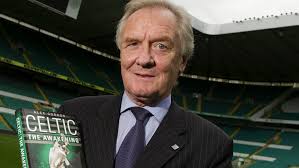
DAVIE HAY…midfield battler, with a copy of ‘CELTIC: The Awakening’, was brought in to face Rangers skipper John Greig.
‘I came in against Hibs,’ recalled Hay, ‘and it was clear Big Jock wasn’t satisfied with the goals the team were giving away. It was difficult to pinpoint the reason. That day, we played reasonably well and then lost what turned out to be the winning goal with virtually the last kick of the ball. It was extremely disappointing. Only one win from our first four games was not what we expected. No-one was resting on their laurels, that’s for sure, and there was certainly no complacency among the players. Big Jock wouldn’t have tolerated that.
‘Sometimes it can just come down to getting into your stride and everything else falls into place. I know that’s an easy way to explain things away, but there are occasions when you can’t get your passing game quite right for whatever inexplicable reason. The effort and endeavour were still there, the players who were good enough to win everything in Scotland were still in attendance and the training hadn’t changed. We just weren’t getting good results.’
Celtic, with only three points from a possible eight, travelled across Glasgow to meet Rangers for the last time in the sixties. Those among the Celtic fraternity might have thought back to the first tussle of the decade when a last-minute goal from Jimmy Miller downed the Parkhead side on New Year’s Day 1960. Quite a lot had happened since Frank Haffey had to fish the ball out of his net that bitterly cold afternoon in the east end of Glasgow. That was then and this was now. Rangers, with Baxter in the side, had five points and had looked more than adequate in successive 2-0 victories over Aberdeen and St.Mirren, However, there had also been a 2-1 flop against Ayr United at Somerset Park.
So, Stein and his men arrived at the home of their great rivals in the realisation that a victory would put them level on points, but a Rangers triumph would open up a four-point gap so early in the season. Once more, it was time to stand up and be counted. ‘Big Jock knew Rangers were strong in the middle of the park,’ said Hay. ‘John Greig was a powerful guy and the Ibrox side would pitch in the likes of Alex MacDonald, Sandy Jardine and Bobby Watson alongside him every now and again. They were all ball-winners and could break up the rhythm of teams going at them.

‘Big Jock had a word with me. “I’m playing you in midfield today, Davie,” he said. “Don’t let them take control. Let them know you are around.” Our manager never once advocated dirty play, but he expected his players to win every 50/50 ball, maybe even 60/40 in the opponent’s favour. I didn’t have a problem with that. If he wanted me to carry out those duties, then I would do my best in that particular role.
‘I remember that game well. Greigy was on the ball when I came in hard to challenge him around the halfway line. The Rangers skipper was solid, but I was made of good stuff myself. I clattered him. The referee gave a free-kick and there wasn’t a murmur from Greigy. A few minutes later there was some of the same. The ball was there to be won and I went for it. Now I’m not too sure how other teams performed against the Rangers captain, that wasn’t my concern, but I was going to make sure he wouldn’t be given time or space against us. And, while I was at it, I would be doing my best to get forward and put pressure on the Rangers defence. After about the third or fourth clash with Greigy I could see him looking at me. He seemed to be thinking, “Who is this guy?” I had been given a role by the manager and I was going to see it through come what may.’
Hay stood his ground, performing with the grit and professionalism that would become associated with him throughout his career. Stein’s ploy worked a treat. Denied Greig’s ability to push the team forward, Rangers were undone by a flash of elegant brilliance by Hood. Years later he recalled, ‘I remember that goal very well. I was clear in the box when the ball fell at my feet. Out the corner of my eye I could see John Greig getting ready to launch himself at me. I switched feet, dodged the tackle and placed the ball between their goalkeeper and the near post. It was the only goal of the game and I was really pleased with it.’
Fallon had his first clean sheet of the campaign. At the fourth time of asking, it was Stein’s first league triumph over White. The gap had been closed and it was now imperative Celtic maintained the momentum. Kenny Dalglish made his first start for the club shortly afterwards in another hand-picked game by the manager. Stein rested Murdoch and put Dalglish in midfield. Celtic eased to a 7-1 triumph over Raith Rovers with Dalglish fitting in quite snugly.
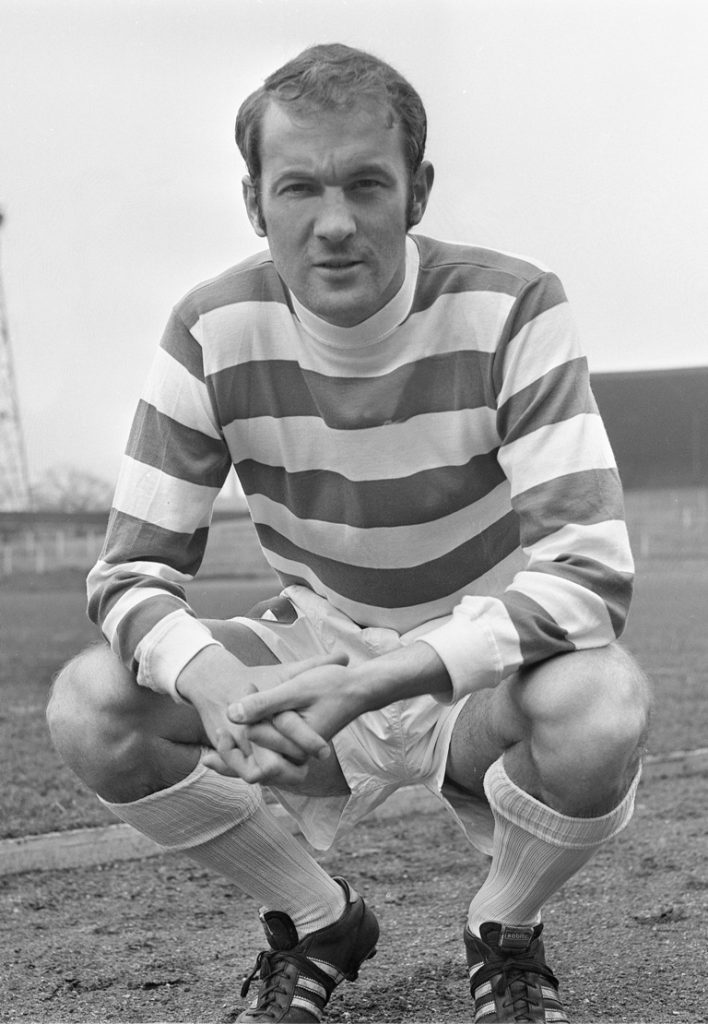
HARRY HOOD…vital League Cup goal.
Celtic turned their attention back to the League Cup semi-final where they faced a workmanlike Ayr United side, managed by future Scotland international boss Ally MacLeod. The likeable gaffer was known by some as ‘Muhammad Ally’ or ‘The Fastest Gums in the West’ in the colourful manner he delivered brash promises and made outrageous predictions. He pledged the Somerset Park faithful they would witness ‘something special’ in the Hampden encounter. He was as good as his word.
Alex Ingram, another of the big, bustling centre-forwards of the time, was bumping into everything in sight as he launched himself at every ball that dropped into the Celtic penalty area. This fiercely-contested affair ended all-square at 3-3. Ayr were applauded for their sterling efforts. ‘Aye, and there’s more to come,’ promised MacLeod. Any individual would have been disappointed in the United manager if he hadn’t said something along those lines.
A week later, their interest in the League Cup came to a halt when goals from Chalmers and Hood piloted Celtic, with Dalglish still in the side, to a 2-1 victory. It was a poignant aftermath, though, with little in the way of celebrations in the Celtic dressing room. With only seven minutes left to play, Ronnie Simpson made a daring save at the feet of Ingram to prevent a certain equaliser. The cheers of the Celtic fans in appreciation of his brave stop came to a halt when they witnessed the keeper writhing in pain and remaining on the ground. Once more his shoulder had given way and once more Gemmell was forced into action as emergency goalkeeper.
‘It was such a shame,’ observed Gemmell. ‘Ronnie had been acting like an excitable kid in the previous game when he was made captain against Airdrie to celebrate his thirty-ninth birthday. It was a nice gesture by Big Jock and Ronnie really appreciated it. I think that was the first-ever time he had led out any team in a career that had started as fourteen-year-old at Queen’s Park. We won that game at Broomfield with goals from Stevie Chalmers and Willie Wallace. Fittingly, Ronnie had kept a clean sheet to mark the moment.
‘Here, though, we were only two days later, playing on a Monday night, and he was being helped off the pitch. Eight months earlier, I had wondered if we would ever see Ronnie in action again when I took over from him against Clyde. I couldn’t prevent myself from thinking along the same lines that night at Hampden.’
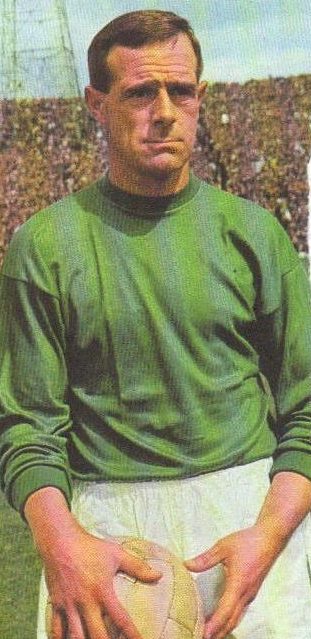
RONNIE SIMPSON…sad career end for the 39-year-old goalkeeping great.
Things were stirring at Ibrox at the same time. White must have sensed he was losing the fan base that had welcomed him so enthusiastically in November 1967. The board were examining his results closely, too. The lustre of White’s first season in charge was gone. Baxter, that eccentric wayward genius, was clearly past his sell-by date. The bravura of his performance against Celtic in his first game back at his spiritual home had very quickly faded. Two goals from Peter Marinello, soon to join Arsenal for £100,000 to become London’s so-called answer to George Best, and one from old Celtic favourite Joe McBride gave Hibs a 3-1 victory in Glasgow.
Changes were in the wind down Govan way. Celtic, as ever, would monitor the situation from not too far away. To pile on the pressure, they won the first piece of silverware up for grabs, defeating St.Johnstone 1-0 in the League Cup Final with a first-minute goal from Auld. The occasion was marred with Chalmers breaking a leg in the first-half. The sight of the seemingly-indestructible striker being stretchered away was a sad one. He wouldn’t feature again that season.
The game itself was interesting enough. It appeared to be even more interesting in the Celtic dressing room before kick-off. Hay was told he was playing in place of Gemmell, who had been a mainstay in the first team. The fans’ favourite had performed in the previous ten games in the competition and had scored three goals, one being the crucial winner over Rangers at Parkhead.
Hay said, ‘Genuinely, I didn’t have a clue I was about to play in that game. Big Tommy obviously didn’t know he was about to be dropped, either. I thought the best I might hope for was a place on the substitutes’ bench – you could name one outfield player back then – but I thought it was more likely I would be watching the action from the stand. About an hour before kick-off, Big Jock read out the team, “Fallon, Craig and Hay…”. Back up there, Boss, did you say Hay? It was quite a surreal moment. I was lost in thought for a moment. I was about to play in my first-ever Cup Final at Hampden and there was the possibility of my first medal. I had played five times in the competition – all at right-back. Now I was in at left-back instead of Tommy which was a wee bit baffling.
‘I knew he wasn’t injured because I had trained with him for the last few days. Also, there was no sign of animosity between the player and the manager. That was a fleeting thought and the main thing now was to concentrate on playing in the actual game and making sure Celtic won the trophy.’
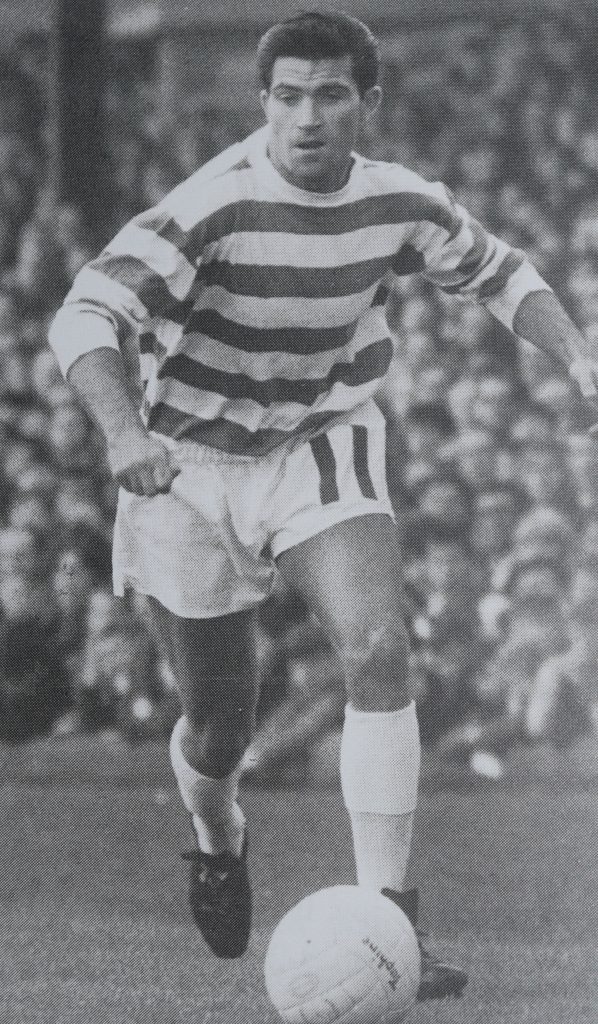
BERTIE AULD… Cup Final winner at Hampden.
‘I was fuming, ‘ admitted Gemmell. ‘When I was given the news as I stepped into the dressing room I just couldn’t believe it. I didn’t want to make a fuss at the time. Immediately, I went across to Davie Hay, shook his hand and wished him all the best. The following day, though, I was still angry. I knew Big Jock held court with some of his newspaper cronies on a Sunday morning at Celtic Park. I phoned him. “Would you like to tell me why I was dropped?” I enquired. “Not over the phone,” answered Big Jock. “Okay,” I said, “I’ll be there in about half-an-hour.” I stayed in Kirkintilloch at the time, jumped into my car and I was at the ground within about twenty minutes.
‘Again I asked, “Why was I dropped?” Jock looked uncomfortable. I had been ordered off against West Germany during a World Cup-tie in Hamburg the Wednesday before the League Cup Final. One of their players, Helmut Haller, tripped me as I prepared to shoot, the red mist came down, I retaliated and, as so often happens in these circumstances, the original culprit got away with it and I was dismissed. I think there was about a minute to go. To make matter worse, Scotland lost 3-2. But that wasn’t on my mind when I returned to catch up with my team-mates as we prepared at Troon for the game against St.Johnstone.

‘I had absolutely no reason to believe I would be left out. No-one even hinted I wouldn’t be playing. I trained as normal and looked forward to the game. I had played in the five League Cup Finals before this one and had enjoyed four successes. So, when we travelled to Glasgow on the day of the game I still didn’t know I wouldn’t figure. I was normally one of the last guys to get changed. Stevie Chalmers, for instance, was always ready to go about an hour before kick-off, but that wasn’t for me. I would greet some family friends and fans at the main entrance at Hampden. I had tickets to pass on and other things to take care of. Then I would go and join the guys in the dressing room.
‘That’s what happened that day. I went up the stairs, got to the door and our former player Jim Kennedy, who did all sorts of jobs around Parkhead, stopped me at the door and handed me tickets for the stand. “What are these for?” I asked. The Prez looked a wee bit embarrassed. “They’re for you, Tommy.” I stopped and thought for a second. No, it was no joke for there was Davie getting ready at the left-back berth. I was quite calm and, like I said, I wasn’t going to cause a stir before a Cup Final.
‘The following day, though, I was determined to have a showdown with the manager. I wasn’t going to accept that sort of treatment. The board wouldn’t have liked the fact that a Celtic player had been sent off while playing for his country and I knew Paddy Crerand was put on half-pay for a month after being ordered off playing against Czechoslovakia in a World Cup qualifier back in 1962. But that was in the days when Bob Kelly ruled the roost. It was different this time around. I don’t believe for a second the board could have persuaded Jock to drop a player if he didn’t want to. I doubt if they would have tried. No, I believe the manager made that decision.
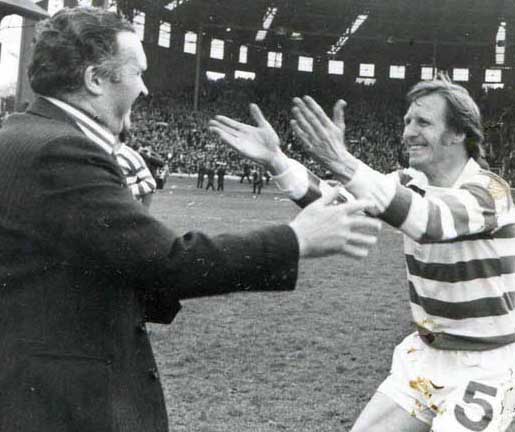
THAT’S MY BHOY…Jock Stein celebrates with skipper Billy McNeill.
‘That being the case, would it have been too much to expect Jock to actually take me aside and give me an explanation? I kept on at Jock. “Why was I dropped?” I repeated. “It can’t be my form, so what’s the problem?” Jock made the usual noises. I wasn’t listening, though. Once he had had his say, I stood up. “You better put me on the transfer list, then,” I said, words I never thought I would use. And with that, I left, got into my car and drove up the road. I didn’t get any sort of explanation and I still wasn’t happy.
‘Of course, Jock knew I didn’t want to leave Celtic. That was always his trump card. No-one wanted to walk away from Celtic and he was aware of that. We were a family and all the lads got on so well with each other. I didn’t want to go, but I don’t think Celtic had left me with much of an alternative. I was happy for Davie to get his first winner’s medal, but I felt a bit humiliated at the same time. I still don’t think that is any way to treat a professional. When I was manager at Dundee and Albion Rovers I never dreamed of doing anything like that to any of my players.’
Stein sent out this side: Fallon; Craig, McNeill, Brogan and Hay; Murdoch and Callaghan; Chalmers, Hood, Hughes and Auld. Johnstone came on as a substitute for Chalmers. The Celtic manager banned physiotherapist Bob Rooney from the dug-out because of the emotional ties with his son, the Perth skipper Benny. St.Johnstone, as expected, stuck to their task throughout, but their concentration lapsed only moments after the kick-off when Auld, with a close-range right-foot drive, converted a low cross that had eliminated keeper John Donaldson at his near post.
‘That was the start we needed, ‘ recalled Auld. ‘St.Johnstone were a well-drilled outfit and you had to work hard against them. They had the players to close ranks at the back and they had guys with speed up front who were deadly on the break. You had to be careful against this lot.
‘I have to laugh when I see a photograph of that goal these days. The defender on the goal-line doing his best to block the shot is none other than John Lambie, who became a very good friend and was my assistant when I was manager at Hibs. Yes, as I seem to remember, I did mention that goal every now and again!’

* TOMORROW: Don’t miss part four of ‘TROUBLE IN PARADISE’, another dramatic instalment of Alex Gordon’s book, ‘CELTIC: The Awakening’– only in your champion CQN.

